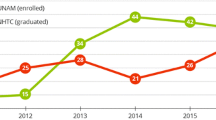Abstract
Namibia has previously relied on external training of pharmacists but began in-country training in 2011. In response to an identified need for postgraduate clinical pharmacy development and training in the country, a Master’s degree was set up at the University of Namibia in 2016. The country has a considerable health burden of HIV and TB as well as a shortage of healthcare professionals. A UK clinical diploma model was adapted to meet the specific needs of the country and wider region, ensuring students could access the course over a sparsely populated, but large geographical spread, in addition to providing work-based learning, embedding research skills for future development, and focusing on the health needs of Namibia. The course uses online learning platforms and contact sessions to cover both knowledge and skill acquisition throughout the 3 years of the course. UK and US clinical pharmacists are utilised to provide specialist input, both remotely and within student workplaces, and further support has come from collaborations, including cross-site visits, with the UK-based pharmacy school whose diploma model was adapted. Challenges have included a shortage of clinical mentors, also compounding the students’ difficulty in visualising their future roles, as well as lone practitioners finding it hard to attend all contact sessions. The initial dropout rates of earlier cohorts have since reduced with greater understanding of the programme, and enthusiasm for the course remains high. The aim for the Master’s is to train students to become competent clinical pharmacists, thus having the knowledge and skills to mentor future cohorts of the course, as well as expanding the specialty within the country.

(kindly reproduced from the International Pharmacy Journal)
Similar content being viewed by others
Notes
524/100,000 people were reported to have TB with approximately one-third of those HIV-positive (4500 total); HIV/AIDS is the leading cause of death in Namibia with a prevalence of about 13.1% [Global Tuberculosis Report 2019. Geneva: World Health Organization; 2019].
References
United Nations Development Programme. Human development indices and indicators; 2018 statistics update. http://hdr.undp.org/en/2018-update. Accessed 27 Sept 2018.
Rennie TW, Haoses-Gorases L, Lates J, Mabirizi D, Nyarang’o P, Sagwa E. Sustaining Namibia: improving the nation’s health through sustainable pharmacy competency. Int Pharm J. 2011;27(1):21–4.
Mapping educational opportunities and resources for health-care workers to learn about antimicrobial resistance and stewardship. Geneva: World Health Organization; 2017 (Human Resources for Health Observer, 21).
Rennie T, Coetzee N, Hunter CJ, Jonkman L, Kalemeera F, Kibuule D, et al. Piloting a new pharmacy internship support programme in Namibia. Pharm Educ. 2018;18(1):88–90.
Brock TP, Brown AN, Rennie T, Rouse MJ. Global pharmacy education: are we nearly there yet? Int Pharm J. 2012;28(1):4–11.
International Pharmaceutical Federation (FIP). Pharmacy workforce intelligence: global trends report. The Hague: International Pharmaceutical Federation; 2018.
Hachey D, Jonkman L, Corkhill N, Rennie T, Lates J, Mubita M. The role of visiting faculty on the training of clinical pharmacists in Namibia: a qualitative study. J Am Coll Clin Pharm. 2020;3:75–80.
Rudall N, Kalemeera F, Rennie T. Implementing clinical pharmacy within undergraduate teaching in Namibia. Int J Clin Pharm. 2015;37(3):427–9.
Udoh A, Bruno A, Bates I, Galbraith K. Transnational comparability of advanced pharmacy practice developmental frameworks: a country-level crossover mapping study. Int J Pharm Pract. 2018;26(6):550–9.
Galbraith K, Coombes I, Matthews A, Rowett D, Bader LR, Bates I. Advanced pharmacy practice: aligning national action with global targets. J Pharm Pract Res. 2017;47(2):131–5.
Meštrović A, Staničić Z, Hadžiabdić MO, Mucalo I, Bates ID, Duggan CA, et al. Individualized education and competency development of Croatian community pharmacists using the general level framework. Am J Pharm Educ. 2012;76(2):23.
International Pharmaceutical Federation. Pharmacy education taskforce—a global competency framework (GbCF v1). 2012. https://fip.org/files/fip/PharmacyEducation/GbCF/GbCF_v1_online_A4.pdf. Accessed 13 Oct 2020.
International Pharmaceutical Federation. Pharmaceutical workforce development goals. 2016. https://fip.org/files/fip/PharmacyEducation/2016_report/2016-11-Education-workforce-development-goals.pdf. Accessed 13 Oct 2020.
Rennie T. Chapter 4: Assessing learning. In: Carter SL, et al., editors. Facilitating learning in healthcare. London: Pharmaceutical Press; 2011.
Davies JG, Ciantar J, Jubraj B, Bates IP. Use of a multisource feedback tool to develop pharmacists in a postgraduate training programme. Am J Pharm Educ. 2013;77(3):52.
Elmes AT, Jonkman LJ, Mubita M, et al. Factors for enrollment in the work-based clinical Master of Pharmacy at the University of Namibia. Poster presented at international pharmacy federation conference, Glasgow, UK; 2018.
Brock T, Wuliji T, Sagwa E, Mabirizi D. Technical Report: Exploring the Establishment of a Pharmacy Course at the University of Namibia, March 12–27, 2009. Submitted to the U.S. Agency for International Development by the Strengthening Pharmaceutical Systems (SPS) Program. Arlington, VA: Management Sciences for Health; 2009.
Funding
None.
Conflicts of interest
All authors declare that they have no conflict of interest.
Author information
Authors and Affiliations
Corresponding author
Additional information
Publisher's Note
Springer Nature remains neutral with regard to jurisdictional claims in published maps and institutional affiliations.
Rights and permissions
About this article
Cite this article
Corkhill, N.L., Lates, J., Mubita, M. et al. Creating clinical pharmacy capacity in Namibia: a collaboration to establish a post-graduate pharmacy degree programme. Int J Clin Pharm 42, 1528–1532 (2020). https://doi.org/10.1007/s11096-020-01063-8
Received:
Accepted:
Published:
Issue Date:
DOI: https://doi.org/10.1007/s11096-020-01063-8




